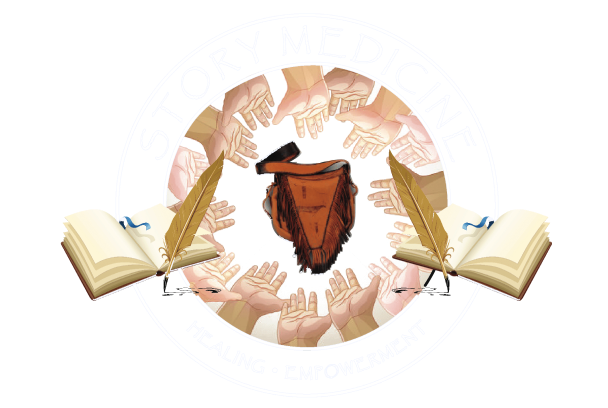Publications
The Mending Time – A Novel
The Mending Time is an intergenerational story that traces two black families on the South Side of Chicago. The book takes an intricate look at the effects of historic discrimination, struggle, migration and urban life on these African descended people. Its nugget culminates inside the story, imagination and resilience of the child whose birth joins these two families. The novel unfolds in four parts, according to West African ritual as described by Malidoma Some’. It offers readers a Sankofa experience in which to change and heal these cycles.
A Review of The Mending Time
Theodore Richards
The Mending Time, the wonderful debut novel from Meta Commerse, is fundamentally about the healing process. Like any good novel, it is centered on questions: How does healing happen, collectively and individually, physically and spiritually? Commerse recognizes that the most important questions cannot ever by fully answered. But part of the answer, one finds, is that we are healed when we realize that we are in this together, that our wounds bind us more than isolate us. Our individual struggles are not separate from the collective. Set over three generations on Chicago’s south side, the novel takes on the difficult subject of the abuse of women and children. Skillfully linking the abuse within the community to the broader abuse that the community as a whole faces, Commerse recognizes that the wounded men who often harm the women in their lives do so in part because of the failure of their society to give black men a voice. And she celebrates the strength of women who realize that, when they start talking about it, they are connected by their pain. The novel is structured, quite intentionally, in the four-fold pattern of an African healing ritual. This speaks to the importance of inter-generational participation in the healing process. A whole world is required to heal a single child; that is, the individual requires a community as well as the ancestors to become whole. The central character, Bea, a child who has faced horrible abuse, finds healing by connecting to older generations and to the healing traditions of her ancestors. Commerse is a writer who works to get to the marrow of issues and to stay there until the healing is done, and her writing brings with it a tremendous amount of depth and skill. Although she has relocated to Asheville, NC, she is from Chicago, and the work evokes a south side of days gone by, before communities were disrupted by the violence and mass-incarceration of the 80’s and the gentrification of today. This is not to say that segregated Chicago is idealized. This is a hard life, and its struggles come through. Healing, for a wounded little girl or a wounded people or a wounded species, also happens through storytelling. This is part of the power of a good novel, and part of the power of those in The Mending Time who find their voice. The one thing we fear –re-living our pain by telling the story — is that which heals us. And while the book begins by burying the bloody shirt of the man who saves a beaten woman, it concludes when the child is ritually freed to tell her story, no longer building psychological “walls” around her self.
Theodore Richards is a poet, writer and religious philosopher. He is the founder and executive director of The Chicago Wisdom Project and is the author of the poetry collection, Handprints on the Womb. Find out more at: http://chicagowisdomproject.org.
GoodReads Comments
“In The Mending Time, Meta Commerse leads the reader on a vivid trip back in time to the 1960s, to an often confusing world seen throught the eyes of an African American girl. Commerse beautifully handles the emotional and spiritual process of the characters surviving and healing from trauma, as individuals and as a community of women.”
“A powerful, spiritual book about family, race and the power of women. The character of 12-year-old B.J, will abide with you long after you finish it.”
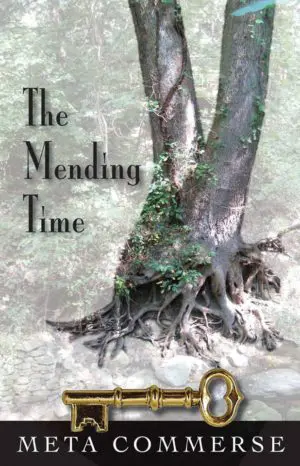
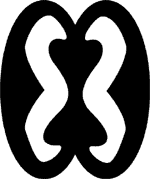
Nkonsonkonson – “Chain Link”
unity and human relations
“I have read your novel. I would say reading The Mending Time was a mystical experience that addresses a timely and difficult topic in a powerful way. It is rich, the characters real, and the novel thought provoking.”
— Pastor Kevin Downer
“I had to read The Mending Time twice, and I couldn’t put it down either time!!! Reading this book helped me to realize why my mother told me to never talk about the things that happened in our house and family with people outside of our family, why we must keep our secrets. I loved the ending and wish that I could have a ceremony to let go of the ugly things that happened to me as I was growing up, that I was taught to keep secret. What a wonderful book for the little black girl inside of us. Thank you Meta Commerse!!”
–A Reader
“The Mending Time by Asheville-based practitioner of story medicine Meta Commerse reads like a classic. It is an unflinching look at a resilient family facing pain with courage and love. B. J., the young female protagonist, will steal your heart, then break it, then heal it. Do yourself a favor and snap up this book today.
— B.H.
Blues Doula
Poems by Meta Commerse
From Foreword:
Blues Doula invites you into Meta Commerse’s life. You enter a Black woman’s her-story: poems about everyday acts and thoughts that witness what make Black life and living painful and joyful…everywhere that Black women live. Most of all, these poems are Meta’s witnessing and documenting the transformation and healing of herself through individual and historical traumas, and the struggles to acknowledge how and why they are connected and continual.
In the end, Blues Doula is an exploration and revelation of what it means to take the journey towards living fully and free within oneself. It is a teaching, one that is offered to us as a gift of love.
Maria Hamilton Abegunde
Indiana University, Bloomington
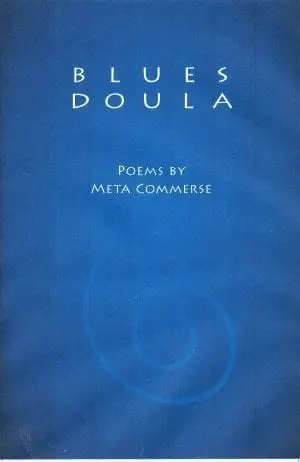

Endorsements
“Blues Doula is fully in and of the spirit, moving through times’s garden, revealing the flowers, weeds and mammoth trees of our humanity.”
— Pamela Plummer, PhD, MSW, MPH
“When I read Meta’s art/work, I time travel. I hear music. I see people and places in a new light. The fact that she speaks poetic truth in times like these is reason to rejoice. Unwrap these gifts slowly and discover the poetic grace that she has prepared for us. Feel yourself shout in recognition on the inside while being nourished allthe way to the core of your soul.”
Elesa Commerse
Touching Earth Mindfulness Learning Center
Evanston, IL
Womaning: A Memoir by
Meta Commerse
In this intimate family portrait explored through the lives of multiple generations of Black Mothers, we get a glimpse of the ways healing can reveal itself until it is fully known. There is a beauty to the symmetry, even in the pain of its repeating nature. Here, in pursuit of truth, Meta Commerse has allowed her story to tell The Story.
Feedback From Our Reading Circles
“A testament to the power of story medicine.”
– JG
“This reading circle inspired me to do deeper work with myself and my relationships.” – JS
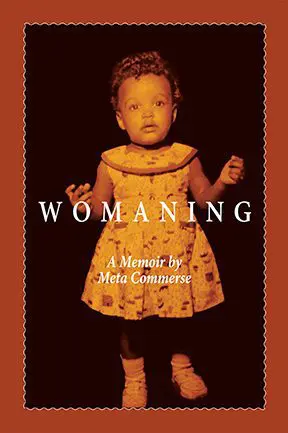
Endorsements
“Reading this book felt like sitting at the knee of an elder, listening to her describe the tapestry of her life, touching each
piece of the fabric as she told its story.” – HW
“Reading this book withing a small community invited me to heed my inner summons to discover, write, speak, embody, and boldly offer my truth, the medicine in my Story.” – MS
A Captivating Read, by Janell Walden Agyeman, Next Steps Literary Services
WOMANING is a captivating read, especially for one who shares the same birth year and Midwestern roots as author Meta Commerse, and who shared several key developmental experiences such as: receiving solid encouragement from elders to learn when they recognized her sharp mind; enjoying a strong upbringing within a church community; navigating broad stretches of life without critical emotional and financial support from her father; being responsible for her younger brother while her mother worked outside the home; and learning to deny feelings and actions that could lead to disfavor from her elders–especially those that dealt with her body and sex. Who and what experiences teach us how to be Women? Are the lessons we receive entirely helpful and truthful? Do we develop soul-deep, knowing confidence or submit to simply following the “rules?” Meta grapples with these questions and shares insights that resonate deeply.
Meticulously crafted with language by turns poetic and prosaic, accompanied by the vibrant soundtrack from the years in which her story unfolds, WOMANING succeeds in sharing Meta’s personal excavation and inspired me to possibly undertake my own. Often recounted in granular detail, her memories amazed and challenged me to attempt the same. Can I remember so clearly and specifically? Do I even want to?
Rarely have I encountered a book that excites in me the desire to see what I might do, on my own, and to suggest why I would be wise to invest in the journey. What demons can I exorcise? What triumphs can I celebrate? How can I live in a way so that I bless the “seven generations behind and seven generations preceding me” that indigenous wisdom tells us is necessary to heal and strengthen our world?
It turns out that Meta is a skilled doula to writers, and that she founded a business devoted to encouraging women to heal their emotional traumas through writing the stories of their lives. Critical, essential topics such as the effects of secrets kept in families, and the abuse and devaluation of women and women’s bodies, are central to her personal exploration in WOMANING. It is no wonder that her life journey developed her abilities to write and publish narrative works and poetry; to make sound nutrition and healthy lifestyle practices priorities for herself and the sturdy family she would nurture; to hone her literary and administrative skills; and to eventually be certified as a health care practitioner and found a wellness clinic.
Highly recommended for its description of an eloquent and conscious black female’s journey to better understand the circumstances and practices that are invested in our development–for better and for worse, WOMANING is also a valuable resource for women who aspire to make the interior journey, dig deep, analyze their emotional artifacts (minus damning judgment) and to affirm and likely heal themselves in the process.
Womaning, A Review by Laura Lengnick, Author, 2022
How does one learn to be woman? What does it mean to be a good girl? How do we recognize when someone is behaving like a lady? When does a maiden become a woman, a woman become a crone?
Meta Commerse explores the answers to these questions in her extraordinary new memoir, Womaning. With clarity and compassion, Commerse shares the lessons learned over six generations of her family about what it means to be woman – girl, mother, lover, wife, worker and elder – and the powerful healing that she has found by looking back on her life and sharing what she has learned.
This fascinating collection of stories examines the joys and sorrows of a family living on the front lines of the American Dream in the last century. Best friends, loving grand-mothers, bullying bosses, shattered dreams, inspiring lovers, broken hearts, and the complexities of raising children and caring for elders – these are one woman’s stories, told to the music of the times, at once both deeply personal and political. Womaning takes the reader through a life shaped by wave upon wave of social unrest challenging America’s dark side, the side that offers opportunity according to race, gender, religion, and class.
A “black woman of a certain age, time and place,” Commerse grew up in the heart of the Civil Rights and Black Arts movements in Chicago. She found herself “in the center of a cultural unfolding, with change exploding everywhere around me.” She tells how she “watched in awe” as her mother started talking about blackness, changing the way she dressed, stopped wearing makeup and straightening her hair, quit her job, went back to school and started writing poetry. She remembers the fear and uncertainty of these times and how the music of John Coltrane, Wes Montgomery, Nina Simone, Aretha Franklin and many others seemed “tailor-made to the feeling that was growing in and among us.”
At the age of 14, church elders selected her escort for the Young People’s Cotillion. Forrest was “tall, slender, dark, with the brightest smile and the world’s biggest, most expressive eyes.” At the afterparty, when Forrest asked her to dance to the song “Ooo Baby Baby” by Smokey Robinson and the Miracles, she refused. She was afraid “that if Forrest held me close in his arms, I would have melted all over him and we would have learned one another’s secrets that night.” Commerse didn’t dare let this happen because she was a good girl.
By the age of 30, Commerse was “a hard-working, home-owning woman whose existence orbited my children’s lives.” Looking back to those days, she recalls “that promising decade of the 1980’s, the skies were clearer as new doors opened to us and we walked in, the very first generation to do so. In that time, love was fresh and redefined for our emergence, our music, now lavish, orchestrated, our songs longer, liquid-like, set to a melody and tempo to usher us into the shiny new world of our middle -class dreams.” Caught up in this feeling, Commerse married for a second time to a successful professional who was “incredibly handsome, very well-spoken, an educated man with an arresting presence.” Although the marriage was over by the time Bill Clinton left office, Commerse felt grateful for the lessons learned. “From start to finish, this marriage was an education. Among its deepest lessons, I did learn something about sexual healing. I learned what being on the receiving end of infidelity felt like. I learned that while dreams do come true, they’re hardly free.”
As a white woman of a certain age, time and place, Commerse’s stories about living in a world made by and for men inspired me to revisit the joys and sorrows of my own life. I saw both my mother and myself in her stories of falling in love, working full-time while raising children and caring for family, and struggling to achieve a sense of self in unstable and ultimately unsatisfying marriages. Her stories got me thinking about all the ways that womaning has influenced my own life and the lives of the women and men in my family. Like Commerse, I believed that professional success and the middle-class income that comes along with it was essential to achieving the American Dream, which to Commerse, meant “to have a home, to be worthy, to have enough.”
Ultimately, Womaning is a book about the healing power of story. Commerse gifts us with a new way to understand our lives by looking back over our past to unearth our most important lessons learned and sharing them with others. She invites us to view ourselves as the next in a collection of nested dolls, each doll representing a generation of ancestors and elders whose stories have shaped ours, reaching through time from the distant past to present day. As Commerse’s remarkable memoir teaches us, examining women’s stories, told and retold within and across generations, can be a powerful path to finding answers to some of the most perplexing questions of our times, no matter where one stands in the crossroads of race, gender, religion, and class in America.
Uniting Through Shared Stories
An Indigenous healing modality blending ritual with the written word. Medicine begins with words in Indigenous cultures.
© 2024 Story Medicine Worldwide ASHEVILLE, NC
